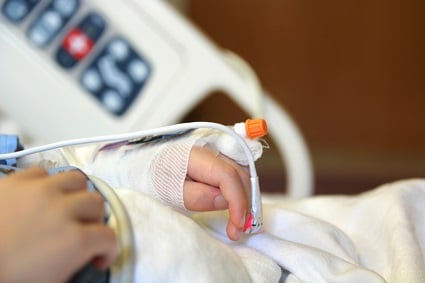The laser-based procedure developed in Manitoba is no longer available in Canada

A brain cancer patient from Winnipeg is hoping to raise enough money for a trip to the US, where she can undergo laser-based surgery.
“I'm willing to fight as long as it takes,” Anastasie Hacault told CBC News. “I just need the tools.”
In 2012, she was diagnosed with an anaplastic astrocytoma, and was given three to five years to live. She has since gone through radiation therapy, chemotherapy, and surgery, which have allowed her to keep working in agricultural services and lead a relatively normal life.
But in May, the tumour on the right side of her brain started to swell, affecting the movement on the left side of her body. She was unable to walk, and is now unable to type. Traditional surgery is no longer an option as it would raise the risk of paralysis.
After weeks of searching, Hacault and her husband, Phil Kaehler, learned about Neurobate, a laser-based surgical procedure that precisely targets hard-to-reach areas of the brain. Developed by Mark Torchia and Richard Tyc of the University of Manitoba, it’s a procedure that was used on 27 patients at Vancouver General Hospital since 2014.
At the end of June, the couple reached out to Dr. Brian Toyota, a BC neurosurgeon with experience performing Neurobate, about possibly getting the surgery. He informed them that it had been discontinued a few weeks prior.
In fact, no clinic or hospital in Canada offers the procedure anymore.
“There's relatively few patients who would have strong indications to have the procedure done, and secondly the device and the disposable is pricey,” Neil Berrington, a neurosurgeon with the Winnipeg Regional Health Authority and a professor at the University of Manitoba, told CBC News.
“So if you want to be responsible and practise cost-effective medicine, it's probably in your interest to have those patients treated elsewhere for the moment.”
Kaehler’s only option is to go to the US, where several facilities still perform the procedure. The couple have learned that it could cost around $150,000; they’re now trying to raise the money through a GoFundMe campaign, which has raised almost $63,000 as of July 18.
“It is our hope that the collection of more data in a clinical trial setting will provide a more definitive evaluation for the therapy and the benefits to patients," said a spokesperson from Vancouver Coastal Health, who added that the health authority should work on finding a stable source of funding.
Related stories:
To avoid long waiting periods, Canadian patients head south
BC patients call on province to cover $100,000 MS treatment
“I'm willing to fight as long as it takes,” Anastasie Hacault told CBC News. “I just need the tools.”
In 2012, she was diagnosed with an anaplastic astrocytoma, and was given three to five years to live. She has since gone through radiation therapy, chemotherapy, and surgery, which have allowed her to keep working in agricultural services and lead a relatively normal life.
But in May, the tumour on the right side of her brain started to swell, affecting the movement on the left side of her body. She was unable to walk, and is now unable to type. Traditional surgery is no longer an option as it would raise the risk of paralysis.
After weeks of searching, Hacault and her husband, Phil Kaehler, learned about Neurobate, a laser-based surgical procedure that precisely targets hard-to-reach areas of the brain. Developed by Mark Torchia and Richard Tyc of the University of Manitoba, it’s a procedure that was used on 27 patients at Vancouver General Hospital since 2014.
At the end of June, the couple reached out to Dr. Brian Toyota, a BC neurosurgeon with experience performing Neurobate, about possibly getting the surgery. He informed them that it had been discontinued a few weeks prior.
In fact, no clinic or hospital in Canada offers the procedure anymore.
“There's relatively few patients who would have strong indications to have the procedure done, and secondly the device and the disposable is pricey,” Neil Berrington, a neurosurgeon with the Winnipeg Regional Health Authority and a professor at the University of Manitoba, told CBC News.
“So if you want to be responsible and practise cost-effective medicine, it's probably in your interest to have those patients treated elsewhere for the moment.”
Kaehler’s only option is to go to the US, where several facilities still perform the procedure. The couple have learned that it could cost around $150,000; they’re now trying to raise the money through a GoFundMe campaign, which has raised almost $63,000 as of July 18.
“It is our hope that the collection of more data in a clinical trial setting will provide a more definitive evaluation for the therapy and the benefits to patients," said a spokesperson from Vancouver Coastal Health, who added that the health authority should work on finding a stable source of funding.
Related stories:
To avoid long waiting periods, Canadian patients head south
BC patients call on province to cover $100,000 MS treatment



